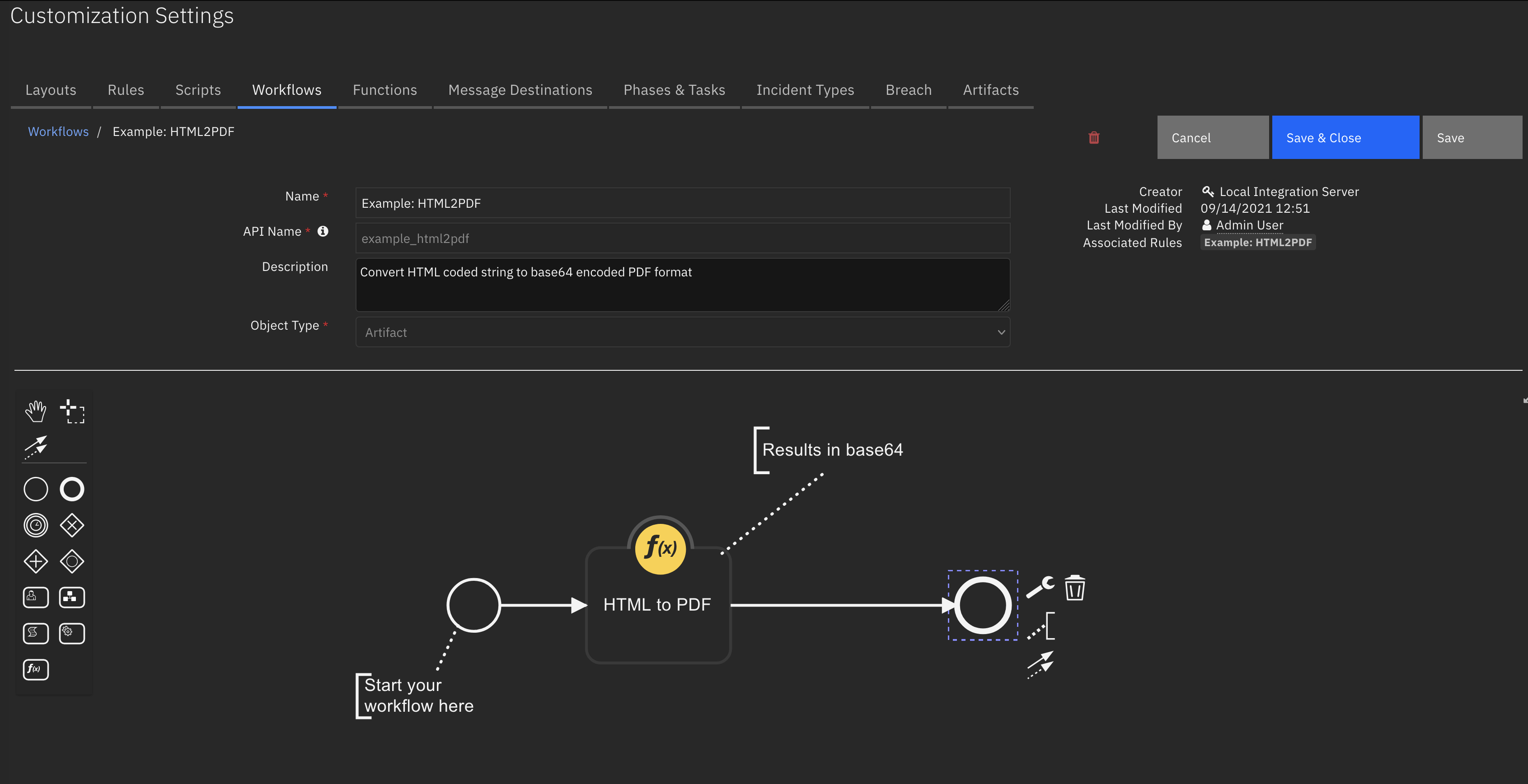HTML to PDF¶
Table of Contents¶
Release Notes¶
Version |
Date |
Notes |
|---|---|---|
1.1.1 |
03/2025 |
Converted example workflows to python3 |
1.1.0 |
09/2021 |
Added App Host support; Dropped Python 2.7 support |
1.0.0 |
09/2018 |
Initial Release |
Overview¶
Convert HTML to a PDF
This function converts HTML data into a base64 encoded PDF document. Alternatively, converts the contents of a website URL into a base64 encoded document.
This function can be used in sequence with other functions, such as fn_utilities:json2html and fn_utilities:base64 to attachment. See Resilient workflows functions and the use of output workflow properties.
Key Features¶
Convert raw HTMl to base64 encoded PDF
Convert HTML from a given URL to base64 encoded PDF
Requirements¶
This app supports the IBM Resilient SOAR Platform and the IBM Cloud Pak for Security.
Resilient platform¶
The Resilient platform supports two app deployment mechanisms, App Host and integration server.
If deploying to a Resilient platform with an App Host, the requirements are:
Resilient platform >=
40.0.6554.The app is in a container-based format (available from the AppExchange as a
zipfile).
If deploying to a Resilient platform with an integration server, the requirements are:
Resilient platform >=
40.0.6554.The app is in the older integration format (available from the AppExchange as a
zipfile which contains atar.gzfile).Integration server is running
resilient_circuits>=30.0.0.This function relies on weasyprint which has OS requirements. When installing on an integration server please see details here for extra operating system packages to install.
If using an API key account, make sure the account provides the following minimum permissions:
Name
Permissions
Org Data
Read
Function
Read
The following Resilient platform guides provide additional information:
App Host Deployment Guide: provides installation, configuration, and troubleshooting information, including proxy server settings.
Integration Server Guide: provides installation, configuration, and troubleshooting information, including proxy server settings.
System Administrator Guide: provides the procedure to install, configure and deploy apps.
The above guides are available on the IBM Knowledge Center at ibm.biz/resilient-docs. On this web page, select your Resilient platform version. On the follow-on page, you can find the App Host Deployment Guide or Integration Server Guide by expanding Resilient Apps in the Table of Contents pane. The System Administrator Guide is available by expanding System Administrator.
Cloud Pak for Security¶
If you are deploying to IBM Cloud Pak for Security, the requirements are:
IBM Cloud Pak for Security >=
1.4.Cloud Pak is configured with an App Host.
The app is in a container-based format (available from the AppExchange as a
zipfile).
The following Cloud Pak guides provide additional information:
App Host Deployment Guide: provides installation, configuration, and troubleshooting information, including proxy server settings. From the Table of Contents, select Case Management and Orchestration & Automation > Orchestration and Automation Apps.
System Administrator Guide: provides information to install, configure, and deploy apps. From the IBM Cloud Pak for Security Knowledge Center table of contents, select Case Management and Orchestration & Automation > System administrator.
These guides are available on the IBM Knowledge Center at ibm.biz/cp4s-docs. From this web page, select your IBM Cloud Pak for Security version. From the version-specific Knowledge Center page, select Case Management and Orchestration & Automation.
Python Environment¶
Since v1.1.0 only Python 3.6 is supported. Additional package dependencies may exist for each of these packages:
pika
resilient_circuits>=51.0.0
weasyprint<53.0
Note: see the Install section below if you are installing on an integration server as more os packages are required.
Installation¶
Install¶
To install or uninstall an App or Integration on the Resilient platform, see the documentation at ibm.biz/resilient-docs.
Further OS packages are required for installation of this app on a local integration server. You must install
pangowith your system’s package installer.
To install or uninstall an App on IBM Cloud Pak for Security, see the documentation at ibm.biz/cp4s-docs and follow the instructions above to navigate to Orchestration and Automation.
App Configuration¶
There are no settings needed to configure this app. Configurations must be set in the workflows that make use of the function.
Function - HTML to PDF¶
Convert html text or a url reference to a base64 encoded pdf document. See details in the “Example Post-Process Script” below on how to appropriately capture the output of the function.

Inputs:
Name |
Type |
Required |
Example |
Tooltip |
|---|---|---|---|---|
|
|
Yes |
|
specify either a html string or url reference |
|
|
Yes |
|
the type of data passed, usually the artifact type. URL or URI are needed for webpage scaping |
|
|
No |
|
css formatted stylesheet information to use when rendering PDF document |
Outputs:
results = {
'content': '<base64 encoded PDF data>'
}
Example Pre-Process Script:
None
Example Post-Process Script:
# results in base64. see output property 'content':
# results.content
# or use workflow properties, such as 'pdf', when using this function with another function such as utilities: base64 to attachment:
# inputs.base64content = workflow.properties.pdf.content
Rules¶
Rule Name |
Object |
Workflow Triggered |
|---|---|---|
Example: HTML2PDF |
artifact |
|
Troubleshooting & Support¶
Refer to the documentation listed in the Requirements section for troubleshooting information.
For Support¶
This is a IBM Community provided App. Please search the Community https://ibm.biz/resilientcommunity for assistance.